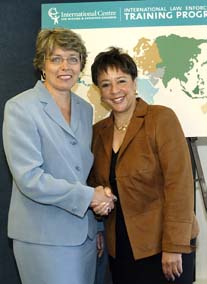
Microsoft Deputy General Counsel Nancy Anderson (left) and Sheila Johnson at launch of the Global Campaign Against Child Pornography, Washington, D.C., April 22, 2004. Click on the photo for a high resolution image
WASHINGTON, D.C., April 22, 2004 — In support of the international community’s effort to address the issue of child safety on the Internet, Microsoft, the International Centre for Missing and Exploited Children (ICMEC), and Interpol April have joined together to create the Global Campaign Against Child Pornography.
Microsoft worked with ICMEC last year to launch a worldwide series of training programs for law-enforcement personnel who investigate computer-facilitated crimes against children. So when Sheila Johnson, a Washington, D.C.-area philanthropist and a member of the ICMEC board, sought a matching donor for her US$500,000 contribution to increase the effort, Microsoft was a logical partner.
The combined $1 million donation enables the Global Campaign Against Child Pornography to coordinate the efforts of international law-enforcement agencies, individuals, and organizations to help eradicate online child predators from the Internet. Equally important, the campaign will work to build public awareness on a global scale, in many languages.
“It will create a system for tracking the incidence of child pornography, identifying its patterns, marshaling expertise, and developing programs to fight it,” Johnson says. “The campaign aims to build a global information-sharing network to help law-enforcement officials identify and rescue the victims of child pornography.”
The campaign will focus on several key objectives, the first of which is to create a global-monitoring and oversight system. Other efforts include the development and promotion of systems for identifying victims and improving the way in which law enforcement can investigate and prosecute offenders. The campaign also aims to develop legislation that ensures consistency among different countries and promotes involvement from the private sector.
“The Internet knows no jurisdictional boundary or geographical border,” says Ron Noble, secretary general of Interpol, “and neither do the criminals who use it to exploit children.”
Says Johnson, “Last year, more than 200,000 reports of Internet child pornography were received by the Web tip line of the National Center for Missing and Exploited Children” (see Related Links, right).”In order to combat global networks of child pornographers, we must all become a global network of child protectors.”
Nancy Anderson, Microsoft deputy general counsel, notes that for Microsoft, as a technology-industry leader as well as one of the world’s leading Internet service providers, the cause is an urgent one.
“It is critical that the Internet, the source of so much benefit for students and educators, not be undermined by those who harm children,” Anderson says. “Sheila has brought all of us together to do more than talk about this issue, but to join others in doing something about it. The Internet must remain a place that is safe and conducive to learning, not an instrument for criminals.”
The combined donation has already begun to provide training for law-enforcement personnel around the world. The first four-day training session was held in December in Lyons, France; the second in Costa Rica in February. The third session concluded April 22 in Brazil. Nearly 300 law-enforcement and judicial officials from 90 countries have benefited from these sessions, and hundreds more are expected to participate this year.




